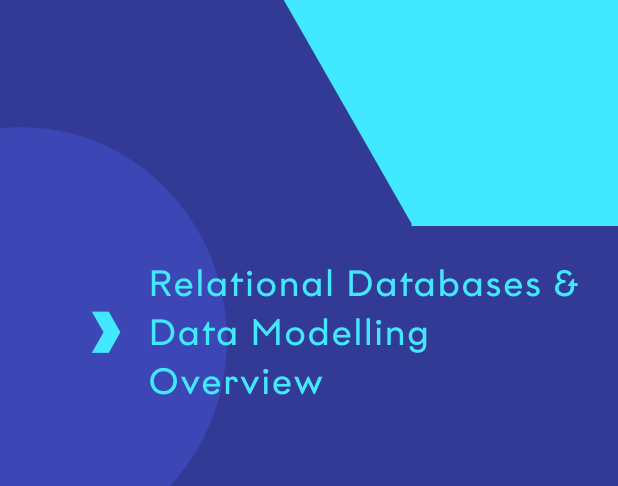Understand the structure of relational databases and learn how to model data effectively for use across business and technical systems. Our course introduces core topics including entity relationship diagrams, data normalisation and schema design, equipping you with the skills to design databases that support development, reporting and data integration.
Relational Databases & Data Modelling Overview
Select your learning method

Develop accurate data models and apply database design principles
Gain a working knowledge of how relational databases operate and how to organise data logically. You will learn to visualise data structures, apply normalisation techniques and interpret relational schemas to support scalable, efficient database design. These skills are essential for developers, analysts and professionals working with structured data environments.
- Explain the purpose and function of Database Management Systems
- Identify key elements of data models including entities, attributes and relationships
- Create and evaluate entity relationship diagrams
- Apply normalisation techniques up to third normal form (3NF)
- Convert conceptual models into relational schemas
- Define and apply primary keys, foreign keys and other constraints
- Understand the use of views and techniques for denormalising data
- Use basic SQL commands to retrieve and update information in relational databasesShape
What you’ll learn
Over two days, you’ll gain practical knowledge of how to design and organise data within relational databases. This course introduces entity modelling, schema design, data normalisation and SQL fundamentals, giving you the skills needed to support database development, improve data quality and contribute to structured information management across systems.
System architecture insights
Explore how data moves through relational database systems by examining key architectural layers, including processing, schema and storage. Understand how each layer contributes to performance, scalability and reliability. You’ll also learn how to describe the function of a Database Management System (DBMS) and evaluate how architectural decisions influence database design, development processes, and long-term system integrity across different business environments.
Modelling complex relationships
Learn to model complex relationships within structured data environments, including handling many-to-many, recursive and arc relationships often found in real-world business processes. You will develop the skills to build clear and accurate entity relationship diagrams that reflect organisational needs. This knowledge ensures your database models support logical structure, technical clarity and alignment with practical use cases and business rules.
Keys and constraints in depth
Gain a deeper understanding of how keys and constraints support data integrity in relational databases. Learn to define and apply candidate keys, primary keys and foreign keys across related tables. You'll also cover attribute and entity constraints, helping you enforce data rules and eliminate inconsistencies. These principles are essential for reliable querying, accurate reporting and long-term database performance and maintainability.
Views and denormalisation
Understand how to simplify data access and optimise reporting through the use of views and denormalisation techniques. You will explore when to create database views and how to apply strategies such as pre-joined tables and derived fields. This module equips you to meet user and reporting needs while maintaining structured, scalable and well-performing relational databases within different business or technical contexts.
- Two-days of instructor-led training in a live virtual classroom
- Interactive hands-on live labs
- All relevant course materials
Key facts
IT professionals, software developers, analysts and anyone progressing into data-focused roles that require understanding relational data structures.
No experience with databases is needed. Basic familiarity with IT terms and system concepts is useful but not mandatory.
Our experienced trainers and interactive labs create a focused, practical environment – so you can put theory into practice from day one.
FAQs
Our practical two-day course provides a clear foundation in relational database principles, data modelling techniques and SQL querying. It’s an excellent starting point if you are new to database design or looking to strengthen your understanding of how structured data supports business systems.
Will this course cover how to structure databases for business reporting?
Yes. You will learn how to model and organise data to support accurate and consistent reporting. From identifying key business entities to defining relationships and constraints, the course prepares you to design databases that deliver reliable information for business intelligence and decision-making processes.
Does this course teach how to handle complex data relationships?
Yes. You will explore advanced relationship types including many-to-many, sub-types and super-types, arc structures and recursive relationships. These modelling techniques are essential for designing relational databases that represent real-world processes effectively and provide a solid basis for data management and analysis.
Can this course help me if I am involved in database migration projects?
Yes. A strong understanding of entity modelling and relational structures is vital for successful migration work. The course provides the knowledge needed to interpret existing schemas, restructure them where required and design new data models that align with evolving business requirements and modern technologies.
What is the difference between entity modelling and relational modelling?
Entity modelling focuses on capturing real-world concepts, their attributes and the relationships between them. Relational modelling translates that conceptual design into tables, keys and constraints that a database can enforce. The course demonstrates how one informs the other and enables you to apply both effectively.
What our customers say

"I really enjoyed this course, it was clear the instructor had in-depth knowledge about the subject and was keen on answering questions / explaining problems thoroughly. I also appreciated learning about the principles, best practice standards, and the reasoning behind these."

"Course was informative and well paced. Instructor was knowledgeable and explained the concept in a clear and well thought out manner."
Join the half a million learners developing their skills with our training
A trusted partner to thousands of organisations worldwide
Our passionate team goes above and beyond to support customer needs
Please complete the form to ensure your quote is accurate and we will contact you soon.